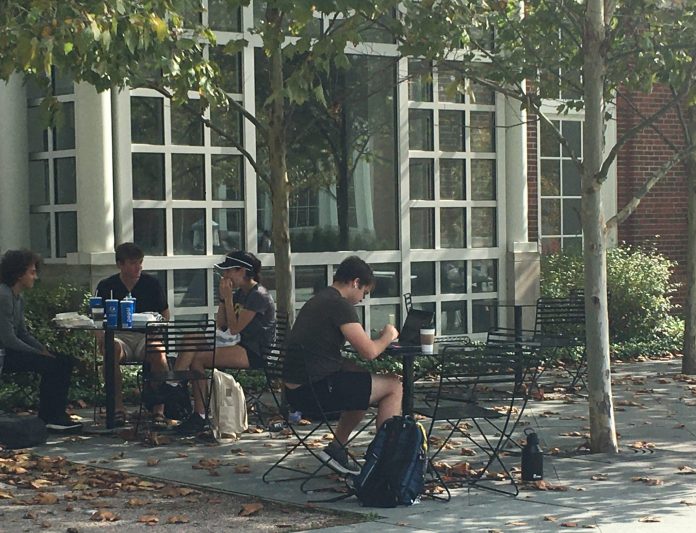
By Noah Jones and Abigail McArthur-Self
With about half of DePauw’s students taking classes completely remote, and half taking classes on campus, students have faced a handful of new challenges this semester.
For returning students’, the social-distancing regulations and limited social events is a stark contrast to, what junior Paige Price called, “the true DePauw experience.” Other than softball and the honors program, Price’s friends are a big part of her DePauw experience.. Price says that she’s used to taking breaks from schoolwork with her friends, and “not being able to have that has just been really hard.”
Price isn’t the only student who feels the “true DePauw experience” is difficult for students to enjoy this semester. Senior Jonathon Tebbe called his experience this semester, “a day by day thing.” While Tebbe says that some days are great, he says, “there’s some days that I definitely wake up in the morning, and I sit down at the computer, and I’m just like, in this fog.” He attributed that partially to a lack of “face-to-face interaction.”
For some first-years, the void of social activities has made the transition to college more difficult than they expected. First-year Katrina Spranger found it difficult to adjust to college because she doesn’t have “anything to look forward to on the weekends. There’s nothing to do during a pandemic,” Spranger said. “It just feels really overwhelming.”
The low number of students on campus and restrictions on social activities has left students with few options to choose from when trying to take a break from school work. According to Spranger, “People kind of disregard the whole, lack of a social life, which I think is honestly one of the biggest things that’s had an impact on my mental health.”
With most juniors and seniors off-campus, the campus is emptier, leaving interactions with peers limited. “Whenever you're walking around campus you don’t see a ton of people and you’re afraid to get close to people because you have to distance, so you don’t really talk,” sophomore Drew Moore said. “Not being able to interact with as many people as we could last year and taking classes online puts a damper on your day.”
Many students have classes online, and a number report having experienced “Zoom fatigue,” a type of exhaustion associated with online interactions. “We’re told all of our lives, like, it’s not good for you to stare at a screen all day… Staring at a screen for … hours a day definitely takes a toll on you, and it’s hard, it’s very hard to unwind,” off-campus senior Julia Sifferlen said.
Students that are living off-campus don’t have access to the academic buildings and libraries that they would normally use as study spaces. Sifferlen has felt that doing schoolwork from her room makes it harder to separate work time from free time. “In previous years, it was very easy for me to like, go to class or go to Roy or go to Julian and do my work there, and then when I come home, I’m done, and I can, like, chill,” Sifferlen said. Without that separation, she feels school has been “a lot more stressful than it usually is.”
On Zoom, according to junior Will Berens, it’s easier for students to disengage from their classes. “The first couple weeks of online classes everyone had their cameras on and were interacting,” he said, “Now everybody has their cameras off, and it’s hard to get that participation and discussion in.”
Even some on-campus students who are taking one or two in-person classes have experienced “Zoom fatigue” as well. First-year Olivia Lockette, said, “It’s hard to look at a screen for so long ... your eyes hurt, you get tired, you get sidetracked, you open a new tab.”
Those on-campus taking in-person classes complain that their classes aren’t consistent, which adds an additional challenge for some students. Lockette and Spranger said that keeping track of the format and adjusting their ways of focusing to match can be a challenge. Spranger wished for a more “consistent” schedule, and Lockette described transitioning between class types as, “constantly turning on and off different parts of [her] brain,” to match the demands of the environment.
The lack of fall break has also impacted some students’ mental health. According to Sifferlen, both students and professors have said that “fall break’s there for a reason.”
Many of the students said that professors talked about being accommodating this semester but how they actually applied that to classes varied. Some, like sophomore Sydney Greene’s professor, are willing to grant extensions to students who need more time, while others are not.
With all of the changes that students’ have felt the effects of, some wish they had more say in the conversation. “I wish the people kind of making the rules and the plan for the school year would also have a conversation with us because I think that we do have a lot of good ideas that could kind of change the way things go here and make it better for people but still stay safe during the pandemic,” Spranger said.
